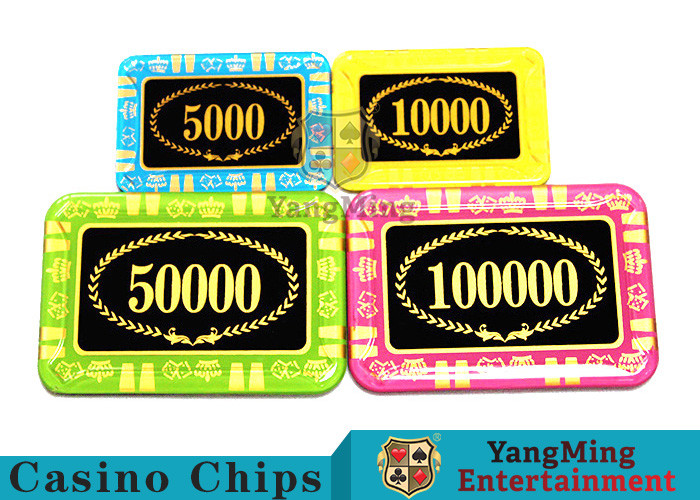Making Counterfeit Casino Chips
Colavecchio said that before he began making counterfeit slot machine tokens, he manufactured casino table game chips, or cheques, by defeating the micro-chip feature, perfecting the composition. Apple is making its own computer chips. Kristin Schwab Nov 11, 2020. Apple is ending ties with Intel and will start using its own computer chips in its products. Justin Sullivan/Getty Images. The truth is that it’s at least as hard to create counterfeit casino chips as it is to create counterfeit money, and maybe even harder. To begin with, the manufacture of genuine casino chips (known in the trade as “checks”) is more complicated than one might think – as you suspect, they’re not just discs of colored plastic.
Posted
- For it to even be profitable for the manufacturing you would need to make more then just some 25's, you need big machinery to manufacture chips, they aren't just made in the back of the casino it would cost a fortune to counterfeit them.
- As the games inside the casino are all different, the winnings depend completely on the players. But still if one cannot figure out the best casino game to make chips in GTA 5, they can see our guide to check the best casino game in GTA 5 online. Read more to find the best casino game in GTA 5 online.
A recent G2E conference session in Las Vegas gave me a chance to hear industry insiders talk about the current usage of RFID (Radio Frequency ID) technology inside casinos. This technology uses radio tags embedded in casino chips to authenticate the chips, and to enable more accurate data gathering on the casino floor. The idea has been around for a number of years now, with Wynn Las Vegas using the system since 2005. In the years since, the technology has slowly improved and more casinos have begun to use the chips. An expert speaker at the conference indicated that perhaps 40 casinos in the US are currently utilizing radio-enabled chips.
Probably the most compelling casino benefit provided by RFID is the ability to validate and authenticate high-value chips. Counterfeit chips can be a major threat to a casino, and having each chip embedded with a radio tag and serial number can be a powerful weapon against fraud. Consider the risk posed by a manufacturer shipping millions of dollars of chips to the casino. With RFID, those chips are just useless tokens until the serial numbers are officially added to the inventory at the casino.
Making Counterfeit Casino Chips For Sale
Another ability of these systems is to automate the counting process, both in the casino cage and in the table game racks on the floor. From the commentary at the conference, the technology does not currently enable a full automated count in the cage, but floor racks can be counted. I don’t know why the full-cage count still poses a problem, but these kinds of limitations seemed to be a common theme throughout the talk. The state of the art just isn’t quite there yet.

For table game players, there are two ways that RFID chips can be problematic:
The first is the use of sensors under each betting circle to accurately determine the amount a player is betting. The benefit to the casino is that average bet ratings can be precisely accurate for each player, and they can eliminate the inaccurate ratings that often allow players to earn comps above the appropriate level. See “How a Basic Strategy Player can Beat Blackjack” for more on that. In addition, if this real-time betting data can be coupled with sophisticated surveillance software, the process of detecting many forms of advantage play could be automated.
The second concern is that RFID tags could potentially allow a casino to “assign” chips to a particular player who won them at the table. If the casino knows who you are (or at least has an assigned profile for you), then chips could be tagged to you specifically. If those chips disappear out of the casino inventory for a time, if you like to stockpile chips for future play, this information would be a problem, especially if someone other than the original player eventually plays the chip or cashes it at the cashier.
Fortunately, although the system sellers paint RFID as an extremely capable platform, there are still holes in all of this process. The casino floor is a messy environment for this kind of orderly tracking. Players move from table to table, and chips are in constant motion. The kind of bulletproof tracking that would allow chips to be assigned to specific players with any degree of certainty just doesn’t exist. In my opinion, this will not change in the next few years. An industry representative admitted as much during the G2E session. When asked if the system could assign a chip to a specific player, his response was that “It could be done”, but he said that in a tone that made clear that the technology today falls short of this goal.
There may be some exceptions to this, particularly in the tracking of junket players who may be assigned inventoried special chips upon their arrival. In that use case, the main goal is to make sure that the junket players are giving the action expected for their trip.
For now, the principle threat that RFID poses to blackjack players is that it may be difficult or impossible to inflate your average bet rating at the table. To accomplish even this requires a substantial investment by the casino in sensors that currently run about $10,000 to equip a single blackjack table.
So, RFID may be here now, but it still falls short of its eventual promise for the industry. For savvy players, that’s a good thing.
Intro
Since casino chips are a form of currency, there is always going to be a problem with people creating counterfeit chips in order to steal money from casinos. Casinos have always been very aware of these risks, and put a lot of effort into preventing any losses. Each casino uses a unique set of chips, even if that casino is part of a bigger casino company, and the chips they use have a few security features. Besides simple factors (such as distinct color combinations, highly-specialized markings, and intricate high-resolution artwork), the chips may incorporate advanced technology, such as RFID or ultra-violet markings.
Making Counterfeit Casino Chips Videos
Besides physical deterrents, the casinos employ various operating procedures to manage counterfeit risk. Many casinos keep a set of chips in reserve with an alternate design so that they can swap out all the old chips from the casino floor and replace them with the new sets. In many jurisdictions, casinos are required to have these alternate chips in reserve. In 2011, the Bellagio got robbed of $1.5 million of casino chips and managed to swap them out within an hour, relegating the stolen chips to being virtually worthless. Casinos are also not required to cash out any chips if they believe the person cashing them out is not the owner of the chips. A common example would be a stripper getting a $1,000 chip as a big tip, and then trying to cash it out at the casino. Sometimes the casinos won't take them in order to prevent money laundering.


There isn't too much data available about how large the casino chip counterfeiting problem is. The Nevada Gaming Commission gets about a dozen complaints each year relating to counterfeit chips. But because of the countermeasures employed by casinos and the heavy penalties by regulators, the financial losses due to counterfeit chips are usually small, and few criminals get away with it.
How easy would it be to rob a casino?
Many gamblers at some point have innocently wondered how difficult it would be steal from a casino by creating counterfeit chips. The truth is that it’s just as difficult to create counterfeit casino chips as it is to create counterfeit money since the chips are manufactured using very specialized equipment. But besides the creation of the chips, I believe it would be more difficult to actually get away with using counterfeit chips than counterfeit money, because ALL casino employees are trained to identify counterfeit chips, while very few retail employees are trained (or even care enough) to identify fake currency.
Making Counterfeit Casino Chips Near Me
COMMENTS:
Log in to post comments
or Register
HPG ADMIN on March 1, 2013